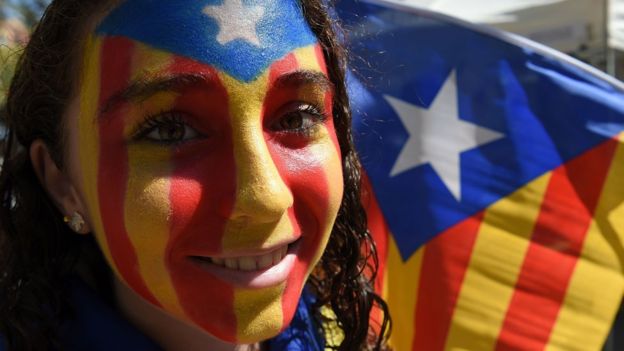Mathew Barton, an English teacher resident in Catalonia since 2002, speaks to EA WorldView’s Digital Media Editor Ellis Palmer Babe about his experience of the celebrations of Catalan National Day — the Diada — in Tarragona:
See also Catalonia Interview: “Hitting the Political Accelerator” for Independence
Catalonia Opinion: The Dawn of Catalan Independence
Tell us a little bit about yourself. How did you come to live in Catalonia?
I arrived in Catalonia basically because of love – my partner is from here and we decided to settle first in Barcelona and then later we moved to where I live now, a small town on the Costa Dorada in the south of Catalonia.
I am a member of the ANC [Catalan National Assembly] and the left-wing party, the Popular Unity Candidature. I have participated with the constituïm.cat initiative, which proposes a constitutional text for a future Catalan state, and with the LGBTQ and immigration groupings of the ANC. I am also the president of an ecological organization, DEFENTERRA, in the area where I live.
The ANC is the main separatist organization. Together with Omnium, it has organized thousands of events in recent years, such as the huge demonstrations on the Diada, the 11th September, to promote the cause of Catalan independence.
The CUP brings together diverse people and left-wing social movements. At both municipal and Parliament level, it has been constantly campaigning for liberation of what it calls the Catalan Countries, which are made up of the historical nation of Catalonia, the Spanish region of Valencia, Andorra, the French region of Roussillon, and the Baleric Islands. It is internationalist and seeks solidarity with all nations, especially stateless ones.
How did you come to be involved in the Diada?
I have been to every major demonstration in support independence since 2004. In 2004 and 2005, I went because I wanted to understand the independence movement. Back then, the demonstrations were rather small with perhaps 10,000 committed people coming out onto the streets. I became an independentist in 2006 — that was the year that growing dissatisfaction with the Spanish state began due to the process of drafting of the Statute [of Autonomy]. Since then, the movement has grown every year.
In July 2010, there was a huge protest against Constitutional Court’s ruling that cut down the Catalan Statute of Autonomy, during which people suddenly started shouting slogans in favor of “independence”.
The turning point came in 2012, when the Diada protest was so large that it occupied the whole of Barcelona from the Diagonal in the north of the city to the sea in the south. I’m going to continue attending the independentist demonstrations at the Diada until Catalonia is independent.
Tell us a little bit about your experience of this year’s Diada.
It was fantastic. I live in the outskirts of Tarragona and I work in Tarragona itself, so I know that it’s a difficult place to mobilize people in favor of independence, as it is least Catalanist area in Catalonia. Therefore, to see the Rambla de Tarragona packed with people holding estelades [flags of independent Catalonia] was amazing.
This year’s demonstration was different due to the fact that it was a decentralized protest as it took place in five different locations across Catalonia – Barcelona, Berga, Lleida, Salt, and Tarragona. This has made it easier to mobilize people closer to where they live and to demonstrate that support for independence exists all over Catalonia, in both urban and rural areas.
What do you think will happen with the Catalan situation in the coming months?
It is so difficult to predict presently. The Spanish situation is so uncertain that there could be a new government installed in Madrid by late October or there could be a third round of elections… Nobody really knows at the moment.
It is unlikely that there a government with the PP [People’s Party] as the PSOE [Spanish Socialist Workers’ Party] do not want to agree to one or even abstain on a vote of confidence. But nor do I think that it is feasible that there will be a government led by the PSOE, because this would only happen with the agreement of Basque and Catalan nationalist parties, whose first demand would be a referendum on independence — something that is totally unacceptable to most of the PSOE’s membership.
Ergo, I suspect that we are headed towards a third set of Spanish elections. If this happens, there will be no possibility of agreeing a referendum in Catalonia; thus, the Catalan government would have to abandon its promise to complete the “process” towards independence in 18 months or will have to hold a unilateral referendum which will create many problems, not least with the rupturist CUP, whose votes they presently depend on for a majority.
I do not know if Yes, Catalonia Can [a coalition of the Catalan branch of the left-wing Podemos party, the Catalan Greens, and more locally-focused groups] want to risk supporting the Puigdemont government. Without Yes, Catalonia Can, the parliamentary majority for a unilateral referendum is still possible, but very low.
In addition, such a unilateral referendum would create many legal problems – for example, under which legislation would it be held? Moreover, should Catalan civil servants and members of polling centers disobey the Spanish justice system?
All in all, I see many complications and nuances in the present situation. But the bloc of society that wants independence is not getting any smaller and is on the increase, slowly but surely. We are now half of the population and we are growing.

